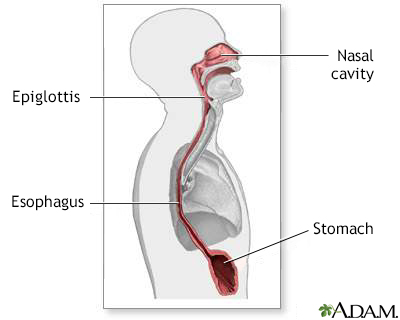Esophageal spasm
Spasm of the esophagus; Distal esophageal spasm; Jackhammer esophagus; Achalasia
Esophageal spasms are abnormal contractions of the muscles in the esophagus, the tube that carries food from the mouth to the stomach. These spasms may not move food effectively to the stomach.
Images



Causes
The cause of esophageal spasm is unknown. Very hot or very cold foods may trigger spasms in some people. Muscle or nerve problems in the esophagus may cause the spasm.
Symptoms
Symptoms may include:
- Problems swallowing or pain with swallowing
- Pain in the chest or upper abdomen
It can be hard to tell a spasm from angina pectoris, a symptom of heart disease. The pain may spread to the neck, jaw, arms, or back
Exams and Tests
Tests you may need to look for the condition include:
- Esophagogastroduodenoscopy (EGD)
- Esophageal manometry
- Esophagogram (barium swallow x-ray)
- Heart evaluation if there is concern that the spasm sensation stems from heart disease
Treatment
Nitroglycerin given under the tongue (sublingual) may help a sudden episode of esophageal spasm. Long-acting nitroglycerin and calcium channel blockers are also used for the problem.
Long-term (chronic) cases are sometimes treated with low-dose antidepressants such as trazodone or nortriptyline to reduce symptoms.
Occasionally, spasm may improve with medicines that block acid production.
Botulinum toxin injections may be done into the esophagus for some conditions that may cause esophageal spasm, such as achalasia, and for distal esophageal spasm.
Rarely, certain cases may need dilation (widening) of the esophagus by endoscopic myotomy (cutting the affected muscles in the esophagus). Surgery may be needed to control symptoms in the case of spastic achalasia.
Outlook (Prognosis)
An esophageal spasm may come and go (intermittent) or last for a long time (chronic). Medicine can help relieve symptoms in many cases. However, other treatments may be needed, especially in the case of achalasia.
Possible Complications
The condition may not respond to treatment.
When to Contact a Medical Professional
Contact your health care provider if you have symptoms of esophageal spasm that don't go away. The symptoms may actually be due to heart problems. Your provider can help decide if you need heart tests.
Prevention
Avoid very hot or very cold foods if you get esophageal spasms. If the spasm also causes trouble swallowing, avoiding difficult foods such as meat, dry breads, and rice may help.
Related Information
Muscle crampsAngina
References
Falk GW, Katzka DA. Diseases of the esophagus. In: Goldman L, Cooney KA, eds. Goldman-Cecil Medicine. 27th ed. Philadelphia, PA: Elsevier; 2024:chap 124.
Pandolfino JE, Kahrilas PJ. Esophageal neuromuscular function and motility disorders. In: Feldman M, Friedman LS, Brandt LJ, eds. Sleisenger and Fordtran's Gastrointestinal and Liver Disease. 11th ed. Philadelphia, PA: Elsevier; 2021:chap 44.
BACK TO TOPReview Date: 10/30/2024
Reviewed By: Jenifer K. Lehrer, MD, Gastroenterologist, Philadelphia, PA. Review provided by VeriMed Healthcare Network. Also reviewed by David C. Dugdale, MD, Medical Director, Brenda Conaway, Editorial Director, and the A.D.A.M. Editorial team.

Health Content Provider
06/01/2025
|
A.D.A.M., Inc. is accredited by URAC, for Health Content Provider (www.urac.org). URAC's accreditation program is an independent audit to verify that A.D.A.M. follows rigorous standards of quality and accountability. A.D.A.M. is among the first to achieve this important distinction for online health information and services. Learn more about A.D.A.M.'s editorial policy, editorial process and privacy policy. A.D.A.M. is also a founding member of Hi-Ethics. This site complied with the HONcode standard for trustworthy health information from 1995 to 2022, after which HON (Health On the Net, a not-for-profit organization that promoted transparent and reliable health information online) was discontinued. |
The information provided herein should not be used during any medical emergency or for the diagnosis or treatment of any medical condition. A licensed medical professional should be consulted for diagnosis and treatment of any and all medical conditions. Links to other sites are provided for information only -- they do not constitute endorsements of those other sites. © 1997- 2025 A.D.A.M., a business unit of Ebix, Inc. Any duplication or distribution of the information contained herein is strictly prohibited.
